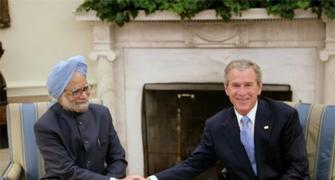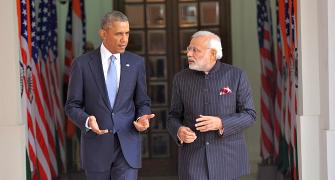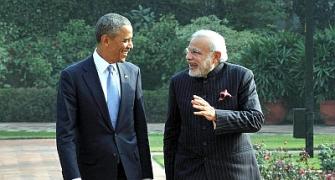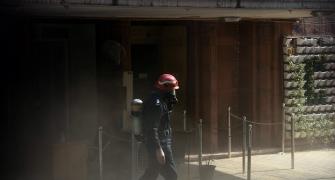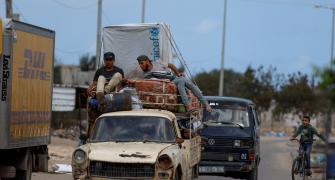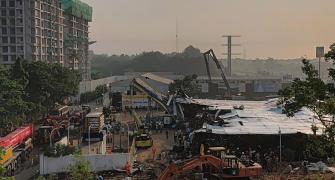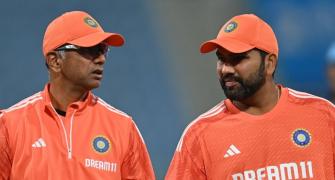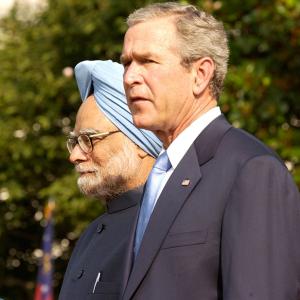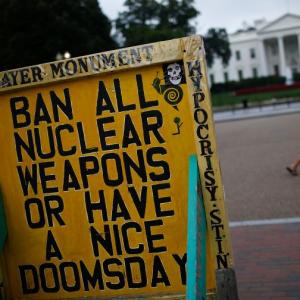July 18 marks a decade since the landmark India-US civilian nuclear deal was struck.
Aziz Haniffa/Rediff.com listens to four Indian and American national security advisers recalling the hard work that went into negotiating the n-deal.

A major highlight of the Carnegie conference celebrating the 10th anniversary of the United States-India civil nuclear cooperation initiative was the US-India Statesmen Forum featuring four former national security advisers from the US and India who were intimately involved in the negotiation of the nuclear deal.
Stephen J Hadley, President George W Bush's NSA, M K Narayanan, Prime Minister Dr Manmohan Singh's NSA, his successor Shiv Shankar Menon, and Tom Donilon, President Barack Obama's NSA.
Hadley at the outset said he grew up in Toledo, Ohio, and then Cleveland, "and the first time I left the United States is actually a year after I graduated from law school, when I went to India for seven weeks."
He traveled to India with his law school classmate Bill Drayton, "who subsequently founded an organisation called Ashoka... social entrepreneurs and its first operation was in India."
Hadley spoke of how "very formative", those seven weeks in India was "and one thing that struck me at the time was why these countries that had so much in common had had such a difficult relationship."
He said he had vowed at the time that "If I ever had an opportunity, I'll see if I can do something about it, and then, of course, we get into the campaign for the presidency in 2000."
"President Bush," Hadley said, "in the campaign said that one of his objectives was to forge a strategic relationship between the United States and India and that was the opportunity we had when he came into office."
"A lot of people have said that's because India was needed by the United States as a balance to China, (but) that was really not how I saw it and that was not how President Bush saw it and not how he talked about it."
"What he said was India is going to emerge and is emerging on the world stage and India is going to be a huge player on the world stage."
Bush, Hadley said, believed that "as we look at the problems we all face, increasingly they are going to be global problems -- terrorism, proliferation, environment, energy, stable economy and all the rest -- for which we will need India's cooperation if we are going to solve them."
President Bush's view, he said, "was that let's get ahead of the situation and use now as an opportunity to forge the kind of relationship with India so that as India emerges as a global player, it will be a partner of the United States rather than an adversary. That was what motivated it in the first place."
The nuclear deal, Hadley added, with "all the problems it had, with people concerned about the proliferation consequences, the advantage of it was it had the potential to really break through, and send a message that it is a new relationship."
It then "opened the door for the kind of cooperation on global issues, where we really wanted to go in the relationship in the first place."
Narayanan -- Hadley's counterpart and the Prime Minister's Office's point person for negotiations with the White House -- declared at the outset, "I am the oldest man in the room and so, I've seen the worst days of the India-US relationship."
To peals of laughter he added that "I was very much part of keeping the Americans at bay."
"Sitting back here and to think that today, I am part of a group, which can claim some role in completely transforming the nature of the relationship," Narayanan said, "is something that I would never have thought was possible."
He recalled the "great hostility between Washington and Delhi during the Cold War years and although Prime Minister Indira Gandhi in her second term and then Rajiv Gandhi and Atal Bihari Vajpayee tried to tear aside the Bamboo Curtain or I would say the Jute Curtain" between India and the US, "I, for one, must confess, I never imagined, that the day will come, when we would establish the relationship that we have been able to establish today. And, particularly that the nuclear issue would become the centerpiece."
Narayanan, who described Hadley as "the midwife of the entire programme," agreed with Hadley that "at no time during the entire process was there any hint, suggestion, etc, that India should be used as a counter-balance to China."
"While there were incremental steps to improve the relationship," he argued, "it required the India-US nuclear deal to completely transform the nature of the relationship."
"In this group," Narayanan pointed out, "I am the only non-diplomat, and for all the brilliance of the diplomats and all the hard work they put in, finally when it comes to a big deal it requires the top leaders to have a common understanding."
"To me," Menon, who has served as both India's foreign secretary and national security adviser, "it's remarkable looking back, if you think of what has happened over the last two decades to the India-US relationship."
With all that has been going on in the world and the changing environment, least of all the rise of China and the change in the Asia Pacific balance, he added, "this is steady, this is a constant for the last two decades."
"I find it incredible and I don't think enough people, we diplomats, and certainly the leaders, give ourselves enough credit for what has happened," Menon said.
He attributed this to "increasing strategic convergence and even the issues that divide us -- I was the foreign secretary when we used to talk about Iran, Myanmar -- they are no longer issues that divide us anymore."
"But when you look at the new issues -- contention in the global commons, maritime security and things like that -- these are all issues where we come closer and closer."
"Purely from an Indian point of view," Menon argued, "the US is an essential partner if we want to transform India."
"There is no way we could do this without the US -- that's very clear," Menon said.
"It's important to underscore the arc of the relationship, since President Clinton's visit," Donilon noted.
"The arc," he acknowledged, "is never going to be perfect -- there are going to be disagreements, there is going to be bumps in the road. But it is important to take a long view and the long view is that the relationship between India and the United States has been transformed in a way you really couldn't have imagined."
"It has been a thoroughly bipartisan policy in the United States," Donilon pointed out and added that it also "has the basis of deep people to people ties. There are three million Indians working in the United States, we have 100,000 Indian students in the US, and the connectivity between our societies and our people also had a lot to do with this."
"It provides a real strength going forward," he added.
"My own recommendation if I were still in my old job would be that President Obama not finish his term without having another visit here by Prime Minister Modi."
"That systematic encounter at the highest levels is really critical because it drives the system. It ensures that the list of things -- and there are dozens and dozens of things -- that came out of these reciprocal visits, you are constantly working on them and you are called into account when the heads of State, of governments get together."
If he were still in the White House, Donilon said, "I would schedule another round with Prime Minister Modi."
Image: President Barack Obama welcomes Prime Minister Narendra Modi at the dinner hosted in the Indian leader's honour at the White House, September 30, 2014. Photograph: Press Information Bureau

